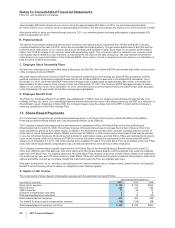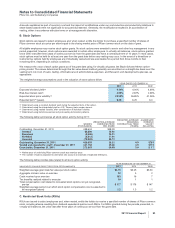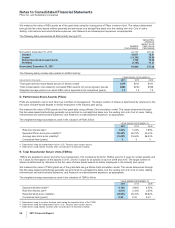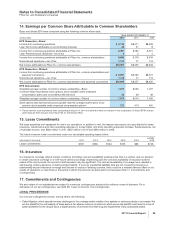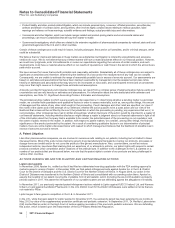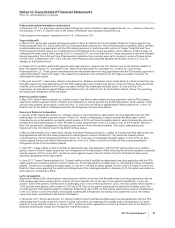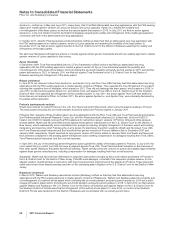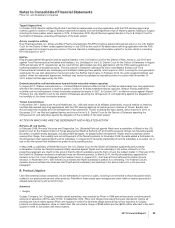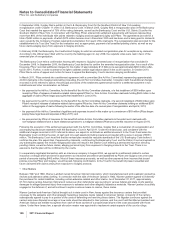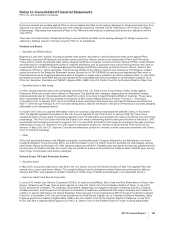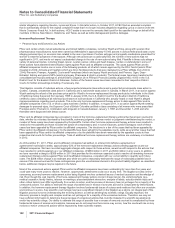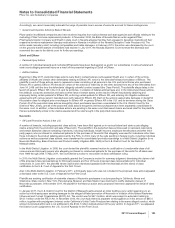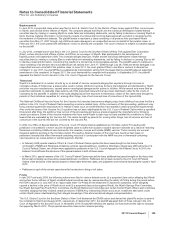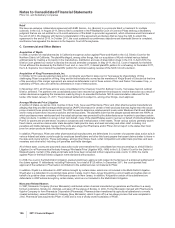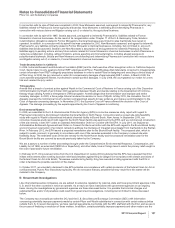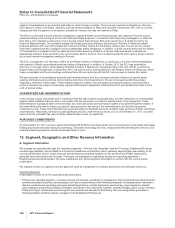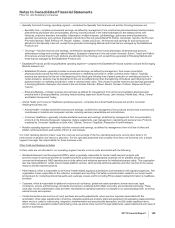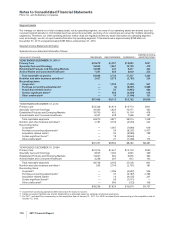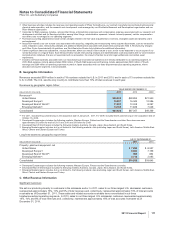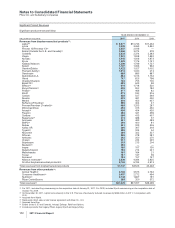Pfizer 2011 Annual Report Download - page 103
Download and view the complete annual report
Please find page 103 of the 2011 Pfizer annual report below. You can navigate through the pages in the report by either clicking on the pages listed below, or by using the keyword search tool below to find specific information within the annual report.
Notes to Consolidated Financial Statements
Pfizer Inc. and Subsidiary Companies
similar allegations regarding Geodon, Lyrica and Zyvox. In this latter action, in October 2011, HCSC filed an amended complaint
that is substantially similar to the original complaint except that it no longer includes allegations regarding Lyrica or claims under the
Illinois Consumer Fraud Act. In both actions, HCSC seeks to recover the amounts that it paid for the specified drugs on behalf of its
members in Illinois, New Mexico, Oklahoma, and Texas, as well as treble damages and punitive damages.
Hormone-Replacement Therapy
•Personal Injury and Economic Loss Actions
Pfizer and certain wholly owned subsidiaries and limited liability companies, including Wyeth and King, along with several other
pharmaceutical manufacturers, have been named as defendants in approximately 10,000 actions in various federal and state courts
alleging personal injury or economic loss related to the use or purchase of certain estrogen and progestin medications prescribed for
women to treat the symptoms of menopause. Although new actions are occasionally filed, the number of new actions was not
significant in 2011, and we do not expect a substantial change in the rate of new actions being filed. Plaintiffs in these suits allege a
variety of personal injuries, including breast cancer, ovarian cancer, stroke and heart disease. Certain co-defendants in some of
these actions have asserted indemnification rights against Pfizer and its affiliated companies. The cases against Pfizer and its
affiliated companies involve one or more of the following products, all of which remain approved by the FDA: femhrt (which Pfizer
divested in 2003); Activella and Vagifem (which are Novo Nordisk products that were marketed by a Pfizer affiliate from 2000 to
2004); Premarin, Prempro, Aygestin, Cycrin and Premphase (which are legacy Wyeth products); and Provera, Ogen, Depo-
Estradiol, Estring and generic MPA (which are legacy Pharmacia & Upjohn products). The federal cases have been transferred for
consolidated pre-trial proceedings to a Multi-District Litigation (In re Prempro Products Liability Litigation MDL-1507) in the U.S.
District Court for the Eastern District of Arkansas. Certain of the federal cases have been remanded to their respective District
Courts for further proceedings including, if necessary, trial.
This litigation consists of individual actions, a few purported statewide class actions and a purported provincewide class action in
Quebec, Canada, a statewide class action in California and a nationwide class action in Canada. In March 2011, in an action against
Wyeth seeking the refund of the purchase price paid for Wyeth’s hormone-replacement therapy products by individuals in the State
of California during the period from January 1995 to January 2003, the U.S. District Court for the Southern District of California
certified a class consisting of all individual purchasers of such products in California who actually heard or read Wyeth’s alleged
misrepresentations regarding such products. This is the only hormone-replacement therapy action to date against Pfizer and its
affiliated companies in the U.S. in which a class has been certified. In addition, in August 2011, in an action against Wyeth seeking
damages for personal injury, the Supreme Court of British Columbia certified a class consisting of all women who were prescribed
Premplus and/or Premarin in combination with progestin in Canada between January 1, 1997 and December 1, 2003 and who
thereafter were diagnosed with breast cancer.
Pfizer and its affiliated companies have prevailed in many of the hormone-replacement therapy actions that have been resolved to
date, whether by voluntary dismissal by the plaintiffs, summary judgment, defense verdict or judgment notwithstanding the verdict; a
number of these cases have been appealed by the plaintiffs. Certain other hormone-replacement therapy actions have resulted in
verdicts for the plaintiffs and have included the award of compensatory and, in some instances, punitive damages; each of these
cases has been appealed by Pfizer and/or its affiliated companies. The decisions in a few of the cases that had been appealed by
Pfizer and/or its affiliated companies or by the plaintiffs have been upheld by the appellate courts, while several other cases that had
been appealed by Pfizer and/or its affiliated companies or by the plaintiffs have been remanded by the appellate courts to their
respective trial courts for further proceedings. Trials of additional hormone-replacement therapy actions are underway or scheduled
in 2012.
As of December 31, 2011, Pfizer and its affiliated companies had settled, or entered into definitive agreements or
agreements-in-principle to settle, approximately 52% of the hormone-replacement therapy actions pending against us and our
affiliated companies. We have recorded aggregate charges with respect to those actions, as well as with respect to the actions that
have resulted in verdicts against us or our affiliated companies, of $336 million in 2011 and $300 million in prior years. In addition,
we have recorded a charge of $359 million in 2011 that provides for the minimum expected costs to resolve all remaining hormone-
replacement therapy actions against Pfizer and its affiliated companies, consistent with our current ability to quantify such future
costs. The $359 million charge is an estimate and, while we cannot reasonably estimate the range of reasonably possible loss in
excess of the amount accrued for these contingencies given the uncertainties inherent in this product liability litigation, as described
below, additional charges may be required in the future.
Most of the unresolved actions against Pfizer and/or its affiliated companies have been outstanding for more than five years and
could take many more years to resolve. However, opportunistic settlements could occur at any time. The litigation process is time-
consuming, as every hormone-replacement action being litigated involves contested issues of medical causation and knowledge of
risk. Even though the vast majority of hormone-replacement therapy actions concern breast cancer, the underlying facts (e.g.,
medical causation, family history, reliance on warnings, physician/patient interaction, analysis of labels, actual provable injury and
other critical factors) can differ significantly from action to action, and the process of discovery has not yet begun for a majority of the
unresolved actions. Our ability to estimate the range of possible loss in excess of amounts accrued is complicated by these factors.
In addition, the hormone-replacement therapy litigation involves fundamental issues of science and medicine that often are uncertain
and continue to evolve. Key scientific court rulings may have a significant impact on the litigation as a whole. An integral part of the
litigation process involves understanding the evolving science, as well as seeking key scientific rulings. Equally important, the
discovery process is lengthy and complex and has not yet begun for a majority of the unresolved actions. Therefore, we may not
have sufficient information to determine the percentage of unresolved actions that could be impacted by scientific developments
and/or key scientific rulings. Our ability to estimate the range of possible loss in excess of amounts accrued is complicated by these
fundamental issues of science and medicine, because we do not know how the science may evolve, how the courts will rule on key
motions or which unresolved actions will be impacted by these scientific matters.
102 2011 Financial Report


